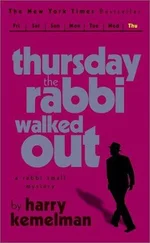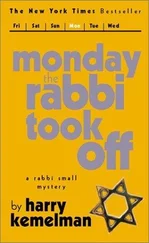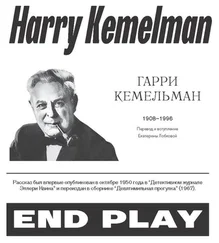Гарри Кемельман - Tuesday The Rabbi Saw Red
Здесь есть возможность читать онлайн «Гарри Кемельман - Tuesday The Rabbi Saw Red» весь текст электронной книги совершенно бесплатно (целиком полную версию без сокращений). В некоторых случаях можно слушать аудио, скачать через торрент в формате fb2 и присутствует краткое содержание. Год выпуска: 2010, Жанр: Классический детектив, на английском языке. Описание произведения, (предисловие) а так же отзывы посетителей доступны на портале библиотеки ЛибКат.
- Название:Tuesday The Rabbi Saw Red
- Автор:
- Жанр:
- Год:2010
- ISBN:нет данных
- Рейтинг книги:5 / 5. Голосов: 1
-
Избранное:Добавить в избранное
- Отзывы:
-
Ваша оценка:
- 100
- 1
- 2
- 3
- 4
- 5
Tuesday The Rabbi Saw Red: краткое содержание, описание и аннотация
Предлагаем к чтению аннотацию, описание, краткое содержание или предисловие (зависит от того, что написал сам автор книги «Tuesday The Rabbi Saw Red»). Если вы не нашли необходимую информацию о книге — напишите в комментариях, мы постараемся отыскать её.
The fifth in a series of definitive editions of Rabbi David Small mysteries by award-winning author Harry Kemelman!
Tuesday The Rabbi Saw Red — читать онлайн бесплатно полную книгу (весь текст) целиком
Ниже представлен текст книги, разбитый по страницам. Система сохранения места последней прочитанной страницы, позволяет с удобством читать онлайн бесплатно книгу «Tuesday The Rabbi Saw Red», без необходимости каждый раз заново искать на чём Вы остановились. Поставьте закладку, и сможете в любой момент перейти на страницу, на которой закончили чтение.
Интервал:
Закладка:
He returned to the apartment and began to go over it more systematically, apparently Hendryx had been neat and methodical. His clothes hung neatly in his closet, the bureau containing his linen was tidy. In a shallow top drawer he kept handkerchiefs and a tray of the usual men's appurtenances— cufflinks, tie clips, a couple of discarded cigarette lighters, a billfold evidently no longer used, a wristwatch and a pocket watch, and a little glass dish with less than a dollar's worth of change, the next drawer contained his shirts, the next his underwear, shirts, shorts, and socks, each separated from each other by thin wooden dividers, then a drawer for his pajamas, the bottom drawer was empty, he decided that Hendryx was a man who didn't like to bend over unless he had to.
The desk was equally well organized with drawers full of notes and manuscripts, the latter in folders with the subject matter carefully inked on the tabs
.A police car delivered Mrs. O'Rourke, a thin, hardworking woman, close to sixty, although the day was quite warm, she wore a heavy imitation fur coat and a shapeless hat of crocheted purple wool.
"Just a few questions," he said. "You were working here Friday?"
"Yes, sir."
"What time did you arrive?"
"Around ten I got here, a few minutes before or a few after. I'm not sure. I plan to come at ten, but it depends on the bus."
"And when did you depart?"
"A little before three, sir, maybe as early as a quarter of."
"Are you sure? Now I want you to think carefully. It's important,” he said, with this type you had to be stern to insure exactness.
"Yes, sir. I plan to make the three o'clock bus at the comer, so I always try to leave a few minutes before, or else I have to wait sometimes as much as half an hour. Isn't it terrible the way the buses run?"
"Yes, yes, and you made the three o'clock bus?"
"Yes, sir. I made it in time."
"All right. What did you do here in the apartment?"
She looked at him in mild surprise. "Why, I clean the place up. I dust and vacuum. I polish the furniture. I make the bed. I wash the tub. I clean the whole place up."
"You straighten out the things in the bureau?"
"I do not, sir," she said indignantly. "I don't open the drawers, and no one can say I did. Professor Hendryx told me not to touch anything in the bureau or his desk and I don't, just the things on top like his comb and brushes, so I can dust and polish."
"All right. Mrs. O'Rourke. I was just asking. So you left the place exactly as it is now."
"Oh no," she protested. "I wouldn't leave the ashes and burned matches in the ashtray, and if there's a book open like that. I'd put it back. But I didn't because there was no book there." She looked about. "And the hassock. I always put it in front of the TV there because the way it is now it would get in my way."
"Just a minute, are you saying that someone was in here after you left?"
"Oh no, just Professor Hendryx, he was always dodging back and forth between here and the school." She sighed. "If he'd only staved here, he would have been alive today, the poor gentleman. Isn't it terrible the way the students behave these days?"
CHAPTER TWENTY-SIX
They were unusually quiet and subdued when he entered the classroom Wednesday morning, the dozen who had been present last Friday must have told the rest what had occurred. Or was it their reaction to the bomb explosion?
All the way from Barnard's Crossing, Rabbi Small had wrestled with his conscience, he hadn't seen his class since he walked out on them. Should he proceed with his lecture as though nothing had happened, or should he apologize? True, their behavior had been intolerable, but on the other hand he now realized no personal disrespect had been intended. On the contrary, thev evidently believed they were doing something fine and noble. But why hadn't they explained? But why hadn't he asked? But they were younger, and they owed their teacher respect. But he was older and should have had more understanding. But they should have realized.. .But he should have realized..."For those who were not here last Friday," he began, "I would like to announce that there was no lecture. To those who were here, I wish to apologize for having walked out. I did not know at the time the reason for the strange conduct of some of the members of the class. Subsequently I did discover it and apologize for not having inquired at the time." He was about to go on, when Mazelman raised his hand. "Yes?"
"I want to know if you think it was right for us— I was one— to sit on the floor?"He said he had just explained he now knew the reason.
"No, what I mean, isn't it part of Judaism, like aren't Jews supposed to protest injustice?"
"Everyone is supposed to." said the rabbi carefully. "It's not a monopoly of Judaism. But are you sure an injustice was done? As I understand it, the chairs were removed from the prison recreation room as a temporary precautionary measure because they had been used for rioting."
"Yeah, but all the kids didn't take part in the riot, but they all had to sit on the floor," one student observed.
«And President Macomber admitted he was wrong," another called out.
"I read his statement." said the rabbi firmly. "He said he had not intended to comment on the merits of this particular case, only to indicate his general confidence in the head of the institution."
"Yeah, but he backed off from what he said the first time, and he wouldn't have if it hadn't been for the student demonstration."
"Did it convince him, or did it force him?" demanded the rabbi. "If his statement indeed represents backing off, was it caused by your sitting on the floor for a couple of days or because he felt that in the present atmosphere in the college it was wiser to defuse a minor situation before it got out of hand? And where is the justice in bullying somebody to agree with you?"
"Well, how do you know he wasn't convinced?"
And now from all over the room:
"What good is just sitting and talking?"
"How about civil rights? They talked for four centuries."
"How about Vietnam?"
"Yah, and Cambodia?"
"How about the Arab refugees?"
The rabbi pounded on the lectern and the yammering came to a gradual stop. In the moment of silence that followed Henry Luftig's voice could be heard, dripping with sarcasm: "Aren't we supposed to be the Chosen People?"
The sally was greeted with shouts of laughter which quieted down, however, when they saw that their teacher was obviously angry. But when he spoke, it was in quiet tones.
"Yes, we are," he said. "Some of you, I see, seem to regard that as amusing. I suppose that to your modern, rationalist, science-oriented minds, the thought of the Almighty making a compact with a portion of His creation is hilariously funny." He nodded judiciously. "Well, I can understand that. But how does it alter the situation? Your modern skepticism can be applied to only one side of the compact, God's side. You can doubt He offered such a compact; you can even doubt His existence. But you cannot doubt that Jews believed it and acted accordingly, that's fact, and how can one quarrel with the purpose and goal of Chosenness: to be holy, to be a nation of priests, to be a light unto the nation?"
"But you got to admit it's pretty arrogant."
"The idea of being chosen? Why? It's not confined to the Jews, the Greeks had it; the Romans, too. Nearer our own time, the English felt it their duty to assume the white man's burden; the Russians and the Chinese both feel obliged to convert the world to Marxism; while our own country feels it must prevent the spread of Marxism and indoctrinate all peoples in democracy, the difference is that in all these other cases, the doctrine calls for doing something to someone else, usually by force, the Jewish doctrine alone calls for Jews to live up to a high standard so that they might become an example to others. I don't see anything to laugh or sneer at about that. Basically, what it calls for is a high standard of personal behavior. It manifests itself in restraints which we impose on ourselves. Some of these, such as the restrictions of kosher food, may strike you as mere primitive taboos, but their intention is to maintain purity of mind and body. In any case, we don't try to foist it on others. Perhaps more to the point is the admonition that you have occasionally received from a parent or more likely, a grandparent, 'This is not proper behavior for a Jew.' Well, that's how the doctrine of Chosenness works in everyday life."
Читать дальшеИнтервал:
Закладка:
Похожие книги на «Tuesday The Rabbi Saw Red»
Представляем Вашему вниманию похожие книги на «Tuesday The Rabbi Saw Red» списком для выбора. Мы отобрали схожую по названию и смыслу литературу в надежде предоставить читателям больше вариантов отыскать новые, интересные, ещё непрочитанные произведения.
Обсуждение, отзывы о книге «Tuesday The Rabbi Saw Red» и просто собственные мнения читателей. Оставьте ваши комментарии, напишите, что Вы думаете о произведении, его смысле или главных героях. Укажите что конкретно понравилось, а что нет, и почему Вы так считаете.










